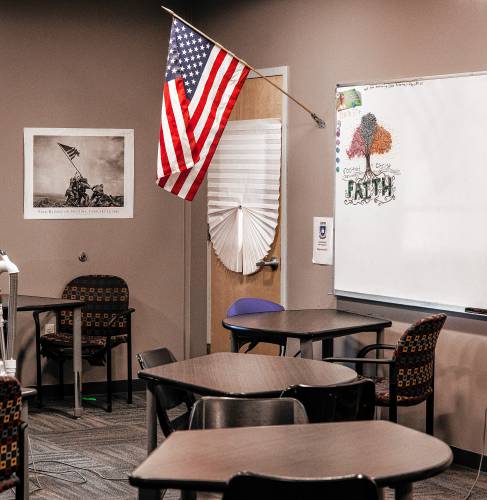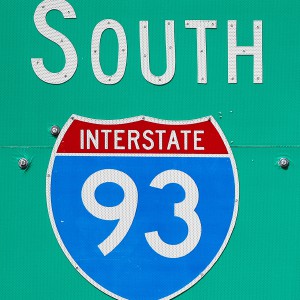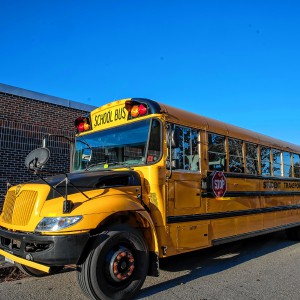Opinion: New Hampshire cannot afford universal EFAs

A Concord Christian Academy classroom. GEOFF FORESTER
| Published: 03-18-2025 6:00 AM |
Patty Long is a retired public school teacher living in Peterborough.
A universal Education Freedom Account bill has cleared its House committee, House Bill 115. Another bill, SB295, also passed in a Senate committee. The purpose of both these bills is to remove the current income restrictions for EFA eligibility.
Taxpayers should have all the facts about EFAs.
The New Hampshire Department of Education does not distribute or oversee the EFA funds. It is the responsibility of The Children’s Scholarship Organization, which is located in New York City, to administer EFA funds. They receive a 10% service fee for all EFA expenses, and in 2024, the organization received over $1.8 million.
Why isn’t our Department of Education managing EFA funds?
Presently, families earning up to 350% of the poverty line — which, for a family of four, means those earning under $109,200 per year — are eligible to receive EFA funds to pay for educational expenses. In 2026, the income level threshold will increase to $128,600 for a family of four.
In 2027, EFAs will truly become “universal” because the income level will be eliminated entirely, and every school child from age 5 to 20 in the state will be eligible for a universal EFA.
Article continues after...
Yesterday's Most Read Articles
 House committee defunds relief program for mothers and children, spares SNAP incentives
House committee defunds relief program for mothers and children, spares SNAP incentives
 No high-speed E-ZPass at Hooksett tolls for at least two months
No high-speed E-ZPass at Hooksett tolls for at least two months
 New Hampshire law enforcement to step up traffic enforcement on Route 106
New Hampshire law enforcement to step up traffic enforcement on Route 106
 Schools in Lakes Region explore creating a special education school to bring down costs
Schools in Lakes Region explore creating a special education school to bring down costs
 Work continues on new state psychiatric hospital in Concord
Work continues on new state psychiatric hospital in Concord
 House committee reverses vote, adopts prohibition on DEI activities and spending
House committee reverses vote, adopts prohibition on DEI activities and spending
It is fiscally irresponsible to pass a bill with the open-ended assumption that “not everyone will apply for universal EFAs.” What if every family did apply? The cost would be astronomical.
A family with an income of $500,000 with four children could receive a tax-free grant of $20,800 deposited into their ClassWallet account. We will effectively be subsidizing wealthy families’ educational costs.
What would be the procedure for awarding universal EFAs? Would the children of low-income families be first in line or would the wealthiest families come first? Will families who can learn about, access, and complete the forms most quickly be granted the award? What happens when the EFA funds are depleted and eligible families have yet to receive their award?
Surprisingly, EFA funds can be used over the summer months for tutoring, tuition, education programs and “specialized education programs.” Remaining funds can be used in any way the Children’s Scholarship Fund deems appropriate now matter how questionable these expenditures seem to be. Remaining funds then roll-over from year to year until high school graduation, which can create a hefty balance.
The EFA Vendor list found on the Children’s Scholarship Fund website details the amounts paid to both providers and retailers. Highlighted below is a snapshot of many questionable expenditures made during the summer months — not even during the school year.
New Hampshire taxpayers are funding these expensive expenditures. How are they deemed educational? Clearly, there are no defined parameters or oversight for these EFA funds:
Piano purchase for $3,750.00 for five children. Circus Camp for $5,890.12 for seven children. Sports Academy for $2,295.00 for one child. Soccer Club for $5,896.25 for three children.
Dance Academy fees for $3,285.00 for one child. Hockey Camp for $6,000.00 for six children. Bike Park expense for $1,306.94 for four children. Theater Camp for $1,400.00 for one child. Art Academy for $5,227.28 for two children.
Horseback riding for $14,755.00 for 42 children. Gymnastics for $7,039.78 for 27 children. Ski Passes for $21,564.19 for 80 students.
Prior to 2021, EFA grants were not a budget line item. Since then the cost of EFAs has grown to over $30 million in its five-year existence.
The executive director of the Children’s Scholarship Fund New Hampshire has been quoted saying that the income cap removal could result in doubling the number of EFA grants awarded, with a projected cost of $60 million by 2027.
Removing the EFA income cap will create an unsustainable financial burden for New Hampshire taxpayers.







 Opinion: Courage and care count
Opinion: Courage and care count
